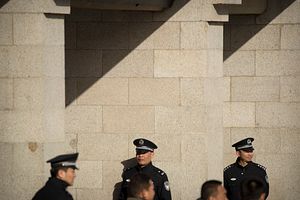On February 5, with a harsher tone, Swedish Minister for Foreign Affairs Margot Wallström released a new statement on the foreign ministry’s website, condemning China’s “brutal” behavior and demanding the immediate release of Gui.
Wallström said in the statement:
The continued detention of the Swedish citizen Gui Minhai in China is a very serious matter. The brutal intervention in January against a Swedish support operation was conducted in spite of repeated assurances from the Chinese authorities that Mr Gui was free at that time. China’s actions were in contravention of basic international rules on consular support. The current situation also raises questions about the application of the rule of law, including the prohibition of arbitrary deprivation of liberty. We demand that our citizen be given the opportunity to meet Swedish diplomatic and medical staff, and that he be released so that he can be reunited with his daughter and family.
Although strongly worded, the statement demonstrated the Swedish government ultimately lacks the political instruments to help its own citizen when faced with China’s strong stance.
As The Diplomat has been following, Gui was one of the five Hong Kong booksellers who disappeared in 2015 and reappeared in the Chinese mainland under police custody. In mid-October 2017, Gui was released and allowed to stay in Ningbo, where his mother lives. In late January 2018, while on a train bound for Beijing from Ningbo, Gui was grabbed and taken away by about ten plainclothes Chinese police officers — right in front of two Swedish diplomats who were accompanying him to the Swedish Embassy for a medical examination. Gui reportedly has shown symptoms of amyotrophic lateral sclerosis, also called A.L.S. — a progressive disease that affects nerves in the brain and spinal cord, resulting in muscle weakness and atrophy.
Chinese foreign ministry spokeswoman Hua Chunying responded to the incident at the regular press briefing on January 23, claiming that “This is not a matter handled by the foreign ministry.” She urged foreign reporters to “inquire with related departments,” but didn’t specify which departments exactly are related to the case.
The Chinese foreign ministry’s ambiguous reply further prompted the European Union and the United States to publicly call for Gui’s immediate release.
In a statement issued on January 24, the European Union revealed that it has “raised Mr Gui’s case with the Chinese authorities and publicly on a number of occasions, most notably in January 2016 when the European Union had demanded clarifications on the disappearance and the status of Mr Gui, as well as four other Hong Kong residents associated with the Mighty Current publishing house.”
The U.S. Department of State also said in its January 27 statement that Washington was “[d]eeply concerned” about Gui’s detention. “We call on Chinese authorities to explain the reasons and legal basis for Mr. Gui’s arrest and detention, disclose his whereabouts, and allow him freedom of movement and the freedom to leave China,” the statement continued.
On February 1, the International Publishers Association (IPA) based in Geneva decided to grant Gui the 2018 Prix Voltaire — an award in honor of the freedom to publish. The prize will come with 10,000 Swiss francs (about $10,700). Kristenn Einarsson, chair of the IPA’s Freedom to Publish Committee said, “The plight of Gui Minhai is an example of the risks some publishers face to bring diverse authors’ voices to the public. It is only right that the publishing community commends him for his bravery, when that bravery has seen him deprived of his freedom.”
The international community’s pressure has been unable to make China provide any detailed information on Gui’s rearrest, not to mention securing his immediate release.
In his personal blog, Jerome A. Cohen, a professor at NYU School of Law and a leading American expert on Chinese law and government, wrote that China “failing to give a public explanation” is “probably because there has been some disagreement or lack of coordination” within the government.
He wrote:
What may have happened is that the local security police in Ningbo may have approved Gui’s trip to Beijing for medical reasons… But the central authorities, when they learned of the plan, may have panicked at the possibility that Gui might seek embassy asylum… and decided to detain Gui again to prevent that possibility. There may also have been, and still might be, a struggle between the Ministry of State Security and the Ministry of Public Security concerning jurisdiction over Gui.
Cohen further estimated that “we will soon see the following explanation from the PRC: Gui was living in Ningbo under ‘qubao houshen’ (取保候审), a Chinese type of bail requiring the ‘released’ suspect to remain in the city where he has been released and requiring him to obtain special permission for any outside trips. ”
































